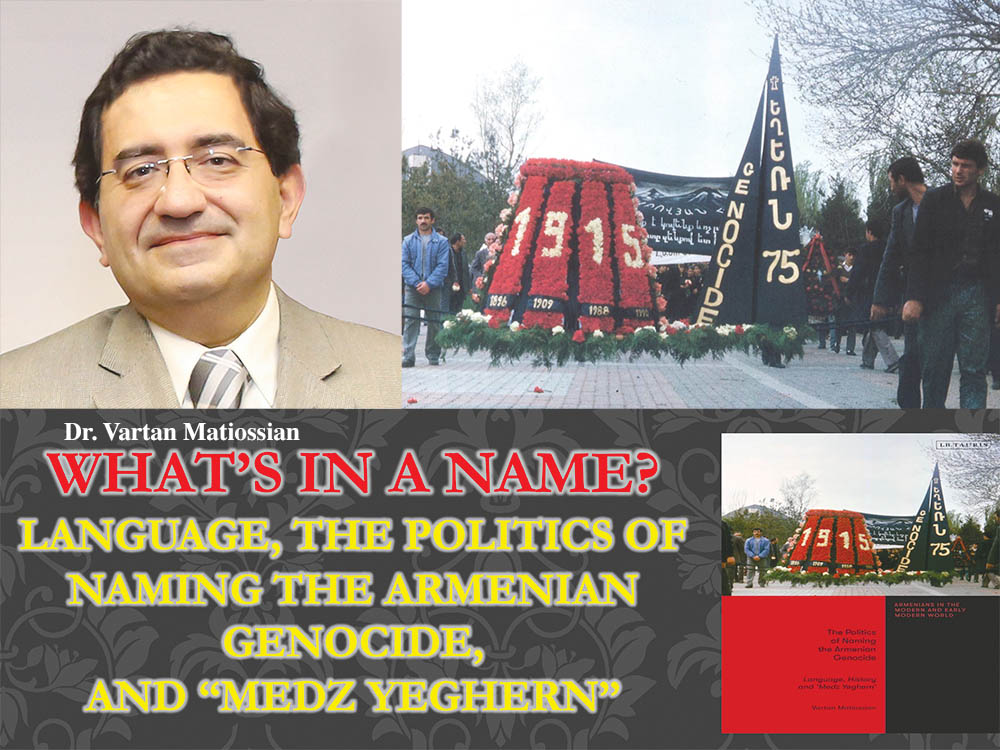
Sara Beberian
Staff Writer
We often forget how important words are. Our choice of words and the way we use certain words can greatly influence the impact our story has on others.
How does one begin to describe a genocide? A completely traumatic event that tears apart homes, families, and everything that is familiar… if the word “genocide” does not even exist? It also becomes increasingly difficult when you when trying to translate the word into another language.
Dr. Vartan Matiossian was the first speaker in the Armenian Studies Program Spring 2022 Lecture Series. Fresno State students and community mem-bers were present on Friday, January 28, 2022, through Zoom, to hear his lecture “What’s in a Name?: Language, the Politics of Armenian Genocide, and ‘Medz Yeghern.’”
Dr. Matiossian was introduced by Armenian Studies Program Director Prof. Barlow Der Mugrdechian. Dr. Matiossian is a co-author of a forthcoming book A Woman of the World: Armen Ohanian, the Dancer of Shamaka, number 16 in the Armenian Series of The Press at California State University, Fresno.
Dr. Matiossian received his doctorate in 2006 from the Institute of History of the National Academy of Sciences of Armenia. He is a literary scholar, historian, and has been the Executive Director of the Eastern Prelacy of New York since 2019. Dr. Matiossian’s presentation was based on his recent book, The Politics of Naming the Armenian Genocide: Language, History and ‘Medz Yeghern’ published in 2021.
The “naming” the Armenian Genocide, and the politics behind naming it, is important in understanding the Genocide. Dr. Matiossian argued that the imprecision around the word “genocide” is increasingly prob-lematic, especially when the genocide is misrepresented by powerful political leaders, who are influential and crucial to the recognition of the Genocide.
Dr. Matiossian began by defining the origins of the word “yeghern,” which has Proto-Indo European roots and means “evil or crime” in classical Armenian. A very similar word, “yegher,” means “lament, mourning,” also in classical Armenian. The primary meaning of yeghern was a crime before 1915, and after 1915, evidence shows “Medz Yeghern” was translated as “great massacres.”
By 1965, the word Tseghasbanutiun (genocide) came into use more often, and the meaning changed again to “the Genocide of the Armenians.” A secondary meaning of “great calamity” or “great catastrophe” for yeghern developed after the early 2000s He argued that this new meaning was “uncritically accepted by the Armenians, leading to self-denial.” This meaning lessened the extent of what happened and could be used by deniers of the Genocide.
U.S. Presidents Bush and Obama used the terms “Great Calamity” and “Meds Yeghern” respectively, thus avoiding using the word Genocide.
Dr. Matiossian also discussed the concept the relation of “cause and effect” in the usage of these terms. The Genocide was no accident, the pain was inflicted on us. In contrast, a “catastrophe” could be pain that is caused by a natural disaster, not by other people making the decision to hurt you. A catastrophe cannot be controlled or apologized for while a crime can be. Using a word like catastrophe allowed the perpetrators, in this case, the Ottoman Turks, to escape responsibility for the Genocide. This presentation illustrated the very real meaning of words and how critical it is to name events in a way that conveys the true meaning of those events. Dr. Matiossian’s meticulous research documented the changing perception of the Armenian Genocide through its naming. Armenians who are seeking a just resolution to their cause must stay vigilant so that the meaning of the word Genocide remains true.
 Hye Sharzhoom Armenian Action
Hye Sharzhoom Armenian Action